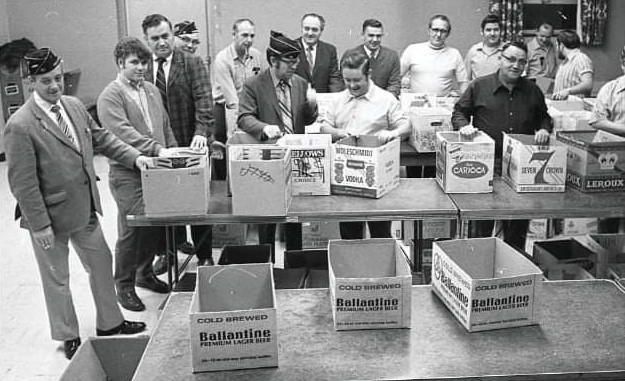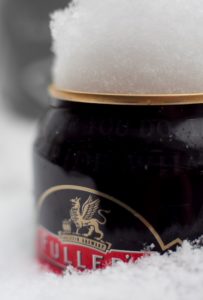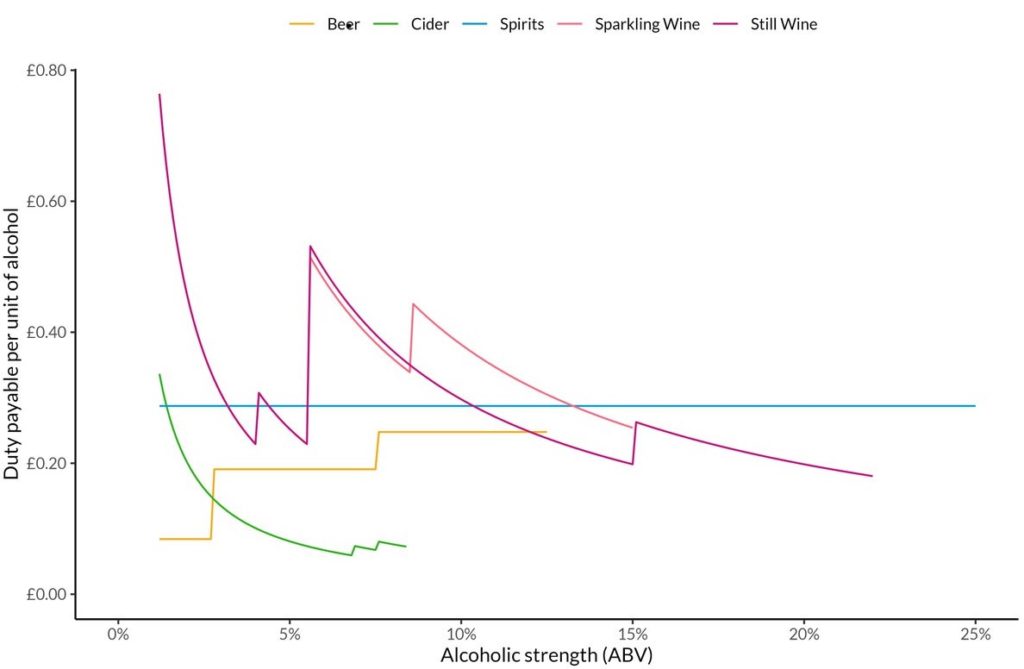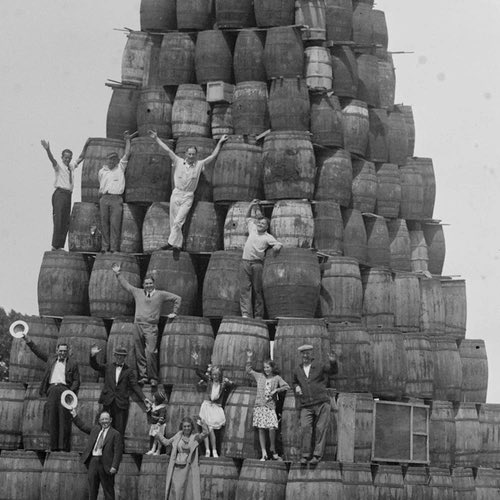It’s beginning to look a lot like… Yuletide fifty years ago right about now when they were packing the Christmas parcels for families in need down at the American Legion post in Watertown, NY in 1971 – back during the Vietnam War era. The lads. WW2 vets I imagine. I noticed those front three boxes just waiting to be filled – Ballantine. The brewery’s share of national brewing sales had tumbled through the 1960s from over 5% of the market to just 1.75% by the time the photo was taken.*
First up, here is some fabulously interesting news about successfully managing a pub during crisis times from Stonch:
I open my pub Thurs-Sun only so that it’s a joy rather than a burden… it means i usually go down to one [cask] ale by late afternoon on Sunday. anything left at closing time we drink, give away in takeaway containers or as a last resort pour down the drain. wastage is low though. remember my london pub was a 5 day a week place so i have experience…
 Equally fabulous is this image to the right from Max on a brewing day in Czechia. Click on it to get the full view but from what I understand he was with “with my man Sigurd we are brewing Kveik raw ale for Česká Televize at Cernokostelecky pivovar” where the green trailer was being used “for the juniper liquor used for the brew.” Neato.
Equally fabulous is this image to the right from Max on a brewing day in Czechia. Click on it to get the full view but from what I understand he was with “with my man Sigurd we are brewing Kveik raw ale for Česká Televize at Cernokostelecky pivovar” where the green trailer was being used “for the juniper liquor used for the brew.” Neato.
Breaking: Newfs lack gas.
Sad to see Shmaltz Brewing bowing out after 25 years:
The biggest, the smallest, most award-winning, and still the only Jewish beer company in America, Shmaltz Brewing Company announces its farewell season after 25 years in the beer business with the first and final release of Bittersweet Lenny’s RIPA in 16oz cans, vintage gems from the Shmaltz beer vault, and a fitting tribute, Exodus 2021 Barleywine Ale (8.8% ABV) brewed with Date, Fig, Pomegranate, and Grape. Shmaltz goes out with a bang with a nationwide “Farewell to Shmaltz Tour” a.k.a. the Class of ’96 Celebration a.k.a. Let My People Brew a.k.a. The No Shmucks Tour…
Long time readers will recall my regular reviews of Shmaltz beers when I used to drive over to northern NY regularly on beer shopping runs. One of the rare breweries which knew how to add fruit to beer while leaving it tasking like beer. Not like the gakky end of the market today.
And in continuing coverage of craft’s retraction, Jordan has his red marker out, deleting the dearly departed contract brewers of Ontario from his list. And Toronto’s Thirsty and Miserable will be gone soon. Sadness. Further news to their south across the big waters, The Tap and Mallet of Rochester, NY has announced its closing.
It is with a heavy heart that we have decided to call time on what has been a truly amazing 14 years… When the pandemic hit it came at a tough time as the pub was already feeling the effects of changes in the craft beer industry that we all continue to enjoy. We all soldiered on but have reached the tough decision that it’s time to call last orders. Our last day will be December 31st….
Fans are sad. There was another sort of lock down and a surprise for other pub goers at the rather elevated Tan Hill Inn seeking an evening with an Oasis cover band this week in England’s Yorkshire Dales:
People travelled to the remote pub, which is 1,732ft above sea level, on Friday to enjoy a performance by the Oasis tribute band “Noasis”. But it soon became clear that they would not be leaving that night due to a Storm Arwen snow blizzard. Makeshift beds had to be laid on the floor of the bar. When guests woke up, most cars outside – and parts of the pub itself – were buried in snow.
They spent three nights there. Were these fans also sad by the end? Dunno.
The Admiral Benbow. And the Admiral Benbow.
Garrett Oliver led a fabulous tweetfest over the weekend on the role of, what, branding versus clarity? IPA v. reality? Authority v. assertion? It all starts here with Joe Stange but goes all off in wonderful directions with loads of viewpoints and counterpoints, entirely rich. I liked this:
I don’t “know” a lot about jazz, but I still enjoy jazz. And I really don’t care what a jazz critic thinks I need to know – I’m having my own good time and I will not be fenced in by anyone. I’ve worked to demystify beer for more than 30 years. It’s supposed to be fun. And it is…
These are the sorts of back and forth self-anointed beer experts either scream in or now totally avoid, the latter given far more wonderful information than these beer experts themselves know, I presume. Not similarly, Oliver Grey had a piece published on the basics of saison this week:
The story of Saison—and its journey from seasonal brewing in Wallonia, Belgium, to year-round availability in taprooms all over the U.S.—is arguably not one of evolution but, rather, mutation. The style, at its core, thrives off the randomized power of genetics. It generally eludes consistent definition and tasting notes, as explained by Phil Markowski in his book, Farmhouse Ales, “expecting Belgian and French beers to follow [a] pattern can lead to disappointment and frustration.”
I wish one point had been added. What we know as Saison and Biere de Garde, as Markowski explains,** was largely made up in the 1970s to meet student and other trendy drinking demands in the 1970s. Makes for a great foundation of the various US craft creative takes, both disconnected from the 1800s.
Seems like a rather generalist approach to the subject.
Me, I am with Delores. Always. He’s crazy. Who? Ron – who is swanning about a tropical beer junket in Brazil where which he will nod and scribble while day dreaming about getting to the buffet and then back to the beach.*** I must stay, the terms and conditions of his compensation package are pretty meagre as he reports:
The organisers of the Brasil Beer Cup paid for my accommodation and food during the period of judging (four nights and three days) Beer, too, which was provided by one of the sponsors. I had to pay for my own cocktails. And all other expenses, such as flights and extra hotel nights.
Cheapskates!! Who are the organizers? Seems to be run by something called the Science of Beer Institute, a joint project of Instituto Cervezas de America (Chile), Berlin Beer Academy (Germany) and Beer Matters (Belgium), Science of Beer and Bier Akademie (Germany). Seems to me they would have the ability to cover a plane ticket for poor Ron, knowing what money sponges these junkets are.
Finally and fairly similarly, the inaugural Canada Cup of Beer… no, Canada Beer Cup ran discount pricing in November but that is over. Not entirely sure it is a good look. The echoing of Brazil’s Beer Cup in the name is odd, too. Won’t match the weather! I’m not yet sure who is running this one as everyone involved seems to describe the event’s organizers as “they.” This sorts of vague thing doesn’t help either. I expect no one wants to take credit for the Toronto Tourism grant (or however it was structured) providing the generous funds which should be involved (if they know what buttons to push) given (reliable sources say) this is really about marketing the town and attracting folk who will write praising articles about “Toronto the Good” during the dark winter days of icy pandemic (“judging is sort of an excuse” sources share) – including a particular wish for (again I am told) Kate B of GBH to show. Hope they don’t sell hats.
There. Your beer nerd cred is topped up for another week. Meantime, check out the updates from Boak and Bailey mostly every Saturday and from Stan every Monday, plus more with the weekly Beer Ladies Podcast, and at the weekly OCBG Podcast on Tuesday and sometimes on a Friday posts at The Fizz as well. There is a monthly sort of round up at The Glass. (Or is that dead now?) There is more from the DaftAboutCraft podcast, too. And the Beervana podcast. And sign up for Katie’s weekly newsletter, The Gulp, too. (That’s a bit now and then now.) And check out the Atlantic Canada Beer Blog‘s weekly roundup. Plus follow the venerable Full Pint podcast. And Fermentation Radio with Emma Inch. The AfroBeerChick podcast as well! And also look at Brewsround and Cabin Fever. And Ben has his own podcast, Beer and Badword (which he may revive some day…) And remember BeerEdge, too, and The Moon Under Water.
*See Tremblay and Tremblay, The U.S. Brewing Industry, tables 4.3 and 8.2.
**I looked for my copy of the book to quote the passage but the effort got too great about 45 seconds. Found it. Look at page 36-38.
***From an alternate universe, another way forward: “I was hired by Robert Parker in 2008, and I will always be grateful for the opportunity he gave me and all that he taught me. In 1978, Parker created a groundbreaking wine publication that was free from financial ties to wineries and merchants, a guide that produced wholly unbiased views on wine, and reviews that served only the interests of wine consumers. It was a magazine funded purely by subscribers—the people that bought, read, and drank by it. Parker’s ethics, as much as his incredible talent, inspired me. I am honored to have worked with him up until the day of his retirement.”














